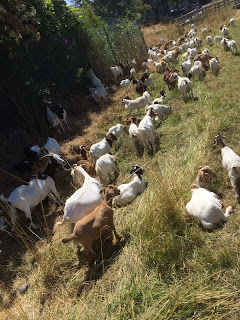For some reason we did not take the plank walkway on the right, but instead took a quiet dirt path on the left. The path led us to tranquil pools of water with numerous duck families floating on water or resting at the water's edge. Unlike the Canadian geese we normally saw at ponds or lakes, Neary Lagoon's mallards were small in stature. They were not scared of us at all when we approached nearer.
Seeing the park entrance not far away, we pretty much gave up on our original plan of watching goats grazing. Just on the point of regretting our bad timing, we saw along the uphill fence hundreds of goats, of all ages and colors. As they were so quiet on the wetlands that we nearly missed them.

Known for their curiosity, some goats were indeed inquisitive, standing on their hind legs from time to time to poke their noses through the fence to see what it was like on the other side. Some were chewing on a shrub's branch collectively. Restrained by their tender age, babies were sunning very happily next to their mothers.

Photos courtesy of Titangos Photography
Since the visit, my mind has been busy: what a brilliant idea it is to let goats clean the wetlands and play in the sun! What is the difference between goats and sheep? I lost no time thanking the park supervisor and checking the web to locate 8 most agreed differences,
1. A goat is the more slender of the two, while a sheep is tubbier.
2. Sheep belong to the Ovas Aries species and have 54 chromosomes, while goats belong to Capra Hircus species and have 6o chromosomes.
3. A goat’s tail, for the most part, stands up while a sheep’s tail hangs down.
4. A goat is a typical a browser, feeding on leaves, shrubs, twigs and vines. A sheep, on the other hand, loves to graze on grass and clover.
5. Goats are curious by nature and are quite independent. A sheep on the other hand prefers to stay put in its flock.
6. While a goat has hair a sheep has fleece.
7. A goat has a beard while a sheep has a mane.
8. Wild goats are found wild in abundance and by all accounts sheep are entirely domesticated.


No comments:
Post a Comment